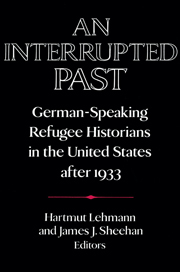Book contents
- Frontmatter
- Introduction
- PART I: Introduction
- 1 German and American Historiography in the Nineteenth and Twentieth Centuries
- 2 German Historiography during the Weimar Republic and the Émigré Historians
- 3 The Historical Seminar of the University of Berlin in the Twenties
- PART II: Introduction
- 4 Refugee Historians in America: Preemigration Germany to 1939
- 5 “Uphill Work”: The German Refugee Historians and American Institutions of Higher Learning
- 6 Everyday Life and Emigration: The Role of Women
- 7 The Special Case of Austrian Refugee Historians
- 8 Schicksalsgeschichte: Refugee Historians in the United States
- 9 German Historians in the Office of Strategic Services
- 10 The Refugee Scholar as Intellectual Educator: A Student's Recollections
- PART III: Introduction
- 11 German Émigré Historians in America: The Fifties, Sixties, and Seventies
- 12 The Americanization of Hajo Holborn
- 13 Explaining History: Hans Rosenberg
- 14 Ernst Kantorowicz and Theodor E. Mommsen
- 15 Refugee Historians and the German Historical Profession between 1950 and 1970
- Conclusion
- Index
3 - The Historical Seminar of the University of Berlin in the Twenties
Published online by Cambridge University Press: 05 January 2013
- Frontmatter
- Introduction
- PART I: Introduction
- 1 German and American Historiography in the Nineteenth and Twentieth Centuries
- 2 German Historiography during the Weimar Republic and the Émigré Historians
- 3 The Historical Seminar of the University of Berlin in the Twenties
- PART II: Introduction
- 4 Refugee Historians in America: Preemigration Germany to 1939
- 5 “Uphill Work”: The German Refugee Historians and American Institutions of Higher Learning
- 6 Everyday Life and Emigration: The Role of Women
- 7 The Special Case of Austrian Refugee Historians
- 8 Schicksalsgeschichte: Refugee Historians in the United States
- 9 German Historians in the Office of Strategic Services
- 10 The Refugee Scholar as Intellectual Educator: A Student's Recollections
- PART III: Introduction
- 11 German Émigré Historians in America: The Fifties, Sixties, and Seventies
- 12 The Americanization of Hajo Holborn
- 13 Explaining History: Hans Rosenberg
- 14 Ernst Kantorowicz and Theodor E. Mommsen
- 15 Refugee Historians and the German Historical Profession between 1950 and 1970
- Conclusion
- Index
Summary
In this chapter I propose as my subject the Berlin historical seminar in the twenties. I might have chosen to discuss Friedrich Meinecke's seminar, of which several German refugee historians were members in the twenties and in the early thirties: Hans Baron, Dietrich Gerhard, Hajo Holborn, Gerhard Masur, Hans Rosenberg. Yet it seems to me preferable to speak in general about the experience of studying history in Berlin; such a discussion will also help to establish the nature and the importance of the influence which Meinecke exerted on those who were to become historians. The Berlin historical seminar in the twenties is a rather wide subject, and this will explain - and I hope excuse - why this chapter takes the form of a personal reminiscence rather than scholarly analysis.
Before studying in Berlin, I had studied in Heidelberg and Munich. I never wavered, however, in my decision to complete my studies in Berlin. There was one very decisive reason why studying history in Berlin, and particularly modern history, was very attractive. Of course, at that time modern history was not global history; it meant European history, with emphasis on German history, and when you studied modern history at the University of Berlin you had a wide choice of whom you wanted as your teacher, and you could slowly and gradually decide on the era and on the field in which you wanted to concentrate.
- Type
- Chapter
- Information
- An Interrupted PastGerman-Speaking Refugee Historians in the United States after 1933, pp. 67 - 70Publisher: Cambridge University PressPrint publication year: 1991



